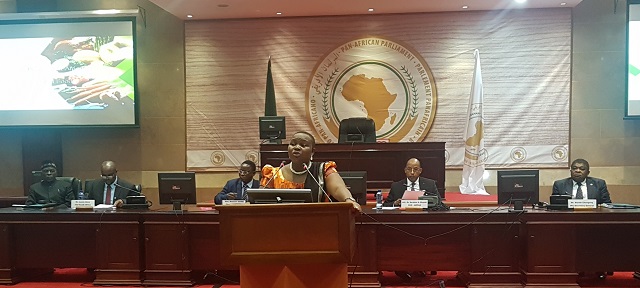
MIDRAND, SOUTH AFRICA | THE INDEPENDENT | The Secretary General of the Inter Parliamentary Union (IPU) has called on African legislators to use their constitutional mandate to prioritise issues of food security and malnutrition, which he said was on the increase in the continent.
Speaking to MPs at a high level NEPAD-Pan African Parliament event on nutrition and food systems on Wednesday, in Midrand, South Africa, the IPU head, Martin Chungong, said parliaments and parliamentarian can influence policies and laws to improve the lives of their citizens.
“It is in this intersection between nutrition, food security and governance that the whole of parliament comes into play, bringing enormous value,” he said adding that “parliaments and parliamentarians can advocate at various levels to elevate nutrition and food security to the top of national agendas with a view to tackling inequalities, strengthening national food systems and making sure that special attention is paid to the populations most in need.”
He said parliaments can and should make sure through their oversight powers that national and international commitments are turned into action through coherent, comprehensive and coordinated policies, programmes and plans.
“Parliaments hold the power of the purse. If fully discharged, these critical functions can ensure that parliamentarians use their powers in the most effective way and where there is greatest need,” he said.
According to the World Health Organisation report released last year, malnutrition was still prevalent in Africa and that the number of stunted children had increased. Using data from national surveys of 47 countries, findings showed that 58 million children in Africa were stunted and one in three women were overweight or obese with rates of over 40 percent in Lesotho, Ghana and Gabon.
In his remarks to legislators, NEPAD CEO Dr. Ibrahim A. Mayaki, said 2018 is a watershed moment in Africa in recognizing the importance of nutrition in the African continent. He said the game changer in Africa was the setting up of the PAP Alliance for Food and Nutrition Security. He commended PAP for the bold move and commitment to the cause noting that a lot more needs to be done.
“Africa remains in a continual crisis and silent emergency of hunger and malnutrition. We owe it to ourselves, more importantly, to the youth and future generations to write our own positive nutrition and food systems script to change the current narrative,” he said.
Amongin Jacquiline, who is the PAP Chairperson on the Committee on Agriculture, Natural Resources and Environment, called on AU Member States to develop policies on school feeding so that children are not malnourished.
“The malnutrition rates in Africa are alarming. If legislators played their roles and put in place policies to address malnutrition and ensuring zero hunger by 2025, we would have contributed to addressing hunger in Africa,” she said.
The one-day high level meeting on nutrition and food systems in Africa attracted participants from the IPU, NEPAD, Food and Agriculture Organisation, UNICEF, the African Development Bank, the continent’s legislators among others.
Participants noted that many governments especially in low and middle income countries lacked the resources or the political will to guarantee adequate nutrition and food systems. They were in unison in their call to legislators to put in place policy and legislative reforms that improve food security and for MPs to use their budgetary powers to make sure that the agricultural sector, which is the mainstay of African economies, is adequately funded.
 The Independent Uganda: You get the Truth we Pay the Price
The Independent Uganda: You get the Truth we Pay the Price



